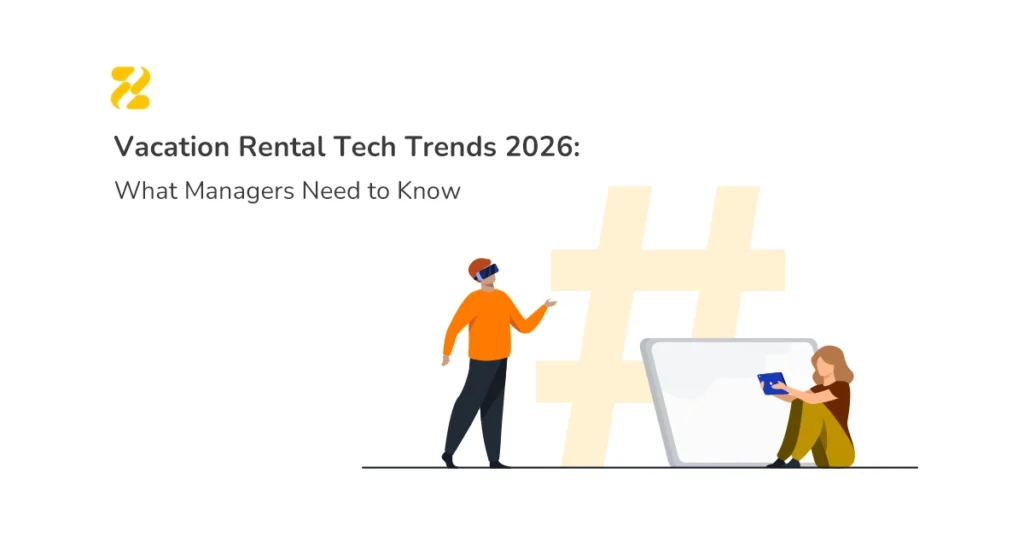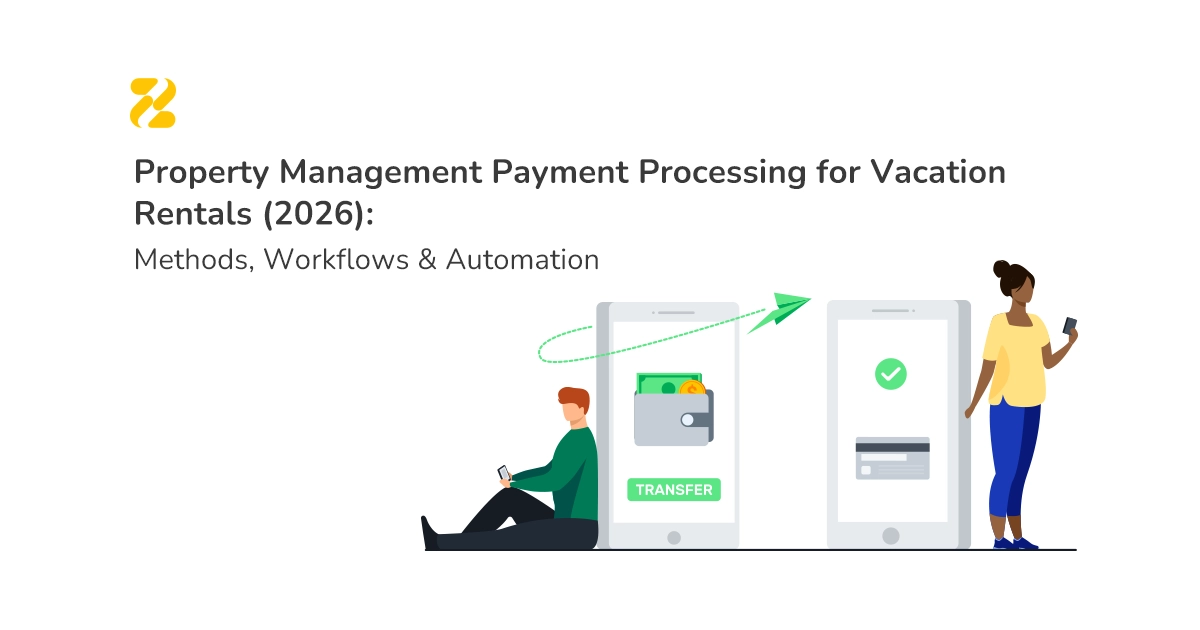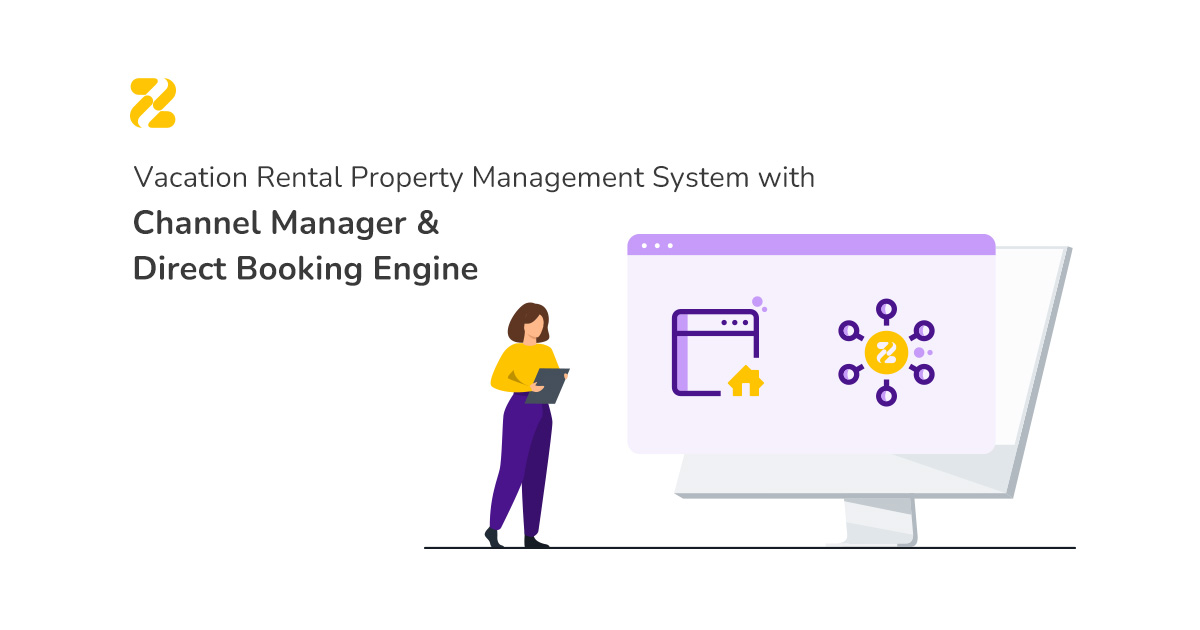The short-term rental market trends are developing rapidly. It is a space defined by complexity and immense opportunity. For professional property managers with large portfolios, the key challenge in 2026 is achieving efficiency amidst rising costs and growing regulatory review. The pressure is on to maximise every booking and streamline every operation.
Manual work and separate tools won’t work anymore. This pivotal moment requires a strategic shift. The 2026 vacation rental trends clearly show that success is reserved for those who embrace integrated vacation rental technology to regain control, save time, and scale profitably.
This deep dive into emerging property management trends provides essential insights into the core technological shifts driving professional growth. These short-term rental trends focus on solutions that act as both an innovative explorer, seeking new revenue streams, and a supportive caregiver, ensuring operational security.
For professional property managers ready to move beyond uncoordinated solutions and truly streamline their enterprise operations, we invite you to read our dedicated solutions for property managers.
Table of Contents
AI Guest Communications: Protecting the Human Side of Hospitality
Artificial intelligence (AI) has rapidly matured from a niche feature into a core operational partner for large property managers. The pressure to achieve operational excellence, driven partly by staffing shortages, makes automating routine interactions absolutely essential. The rise of AI guest communication is one of the most significant short-term rental trends defining 2026.
Automation for Efficiency and Speed
AI guest communication platforms are now highly reliable. Data shows a significant increase in the use of AI-powered guest messaging among property management trends. One provider reported a 45% increase in adoption, with nearly 60% of suggested replies being sent without any edits. This proves that AI is a trusted, day-to-day partner.
This reliability enables managers to handle high-volume communication across all channels instantly. AI automatically manages common, repetitive queries, such as “What is the Wi-Fi password?” or “Where do I park?”, which typically consume huge amounts of staff time. This streamlined approach directly addresses the market’s focus on operational efficiency. By centralising messages and handling mundane tasks instantly, the AI reduces administrative burden and eliminates the risk of losing guests due to slow response times.
Hyper-Personalisation and VIP Flagging
The true value of advanced AI extends beyond simple automation; it enhances the authentic guest experience. Modern platforms, powered by advanced vacation rental technology, use contextual data to pre-emptively deliver tailored information, services, or upsells that genuinely resonate with each guest. This includes the ability to proactively label repeat guests and corporate bookers with badges (such as Gold, Silver, or Bronze) to ensure customised service and significantly boost long-term engagement and loyalty.
Critically, the AI system acts as a triage nurse. It handles low-value inquiries automatically, freeing up precious human staff capacity for high-stakes interactions. Complex issues, VIP complaints, or unique service needs are flagged and escalated, ensuring that human empathy is deployed exactly where it is needed most. AI, therefore, protects the human side of hospitality rather than replacing it. It ensures that staff resources, which are under pressure across industry , are used for maximum impact.

Property Management Software as the New Transparency Standard
In 2026, regulatory compliance is transforming from an administrative chore into a critical competitive barrier. Scaling portfolios exponentially increases the risk of financial and legal non-compliance. Without robust vacation rental technology, navigating this landscape is impossible.
Mitigating Regulatory Risk (GDPR and Registration)
Regulation is a defining factor in the industry. For instance, nearly half (42%) of property managers expect local or state regulations to limit their ability to meet business targets. Furthermore, new EU legislation, Regulation (EU) 2024/1028, will become effective in May 2026. This regulation mandates standardised data-sharing and introduces digital registration systems for hosts.
For managers dealing with EU guests or properties, adhering to the General Data Protection Regulation (GDPR) is non-negotiable. A central Property Management System (PMS) is essential for adhering to GDPR rules regarding guest consent, secure data storage, and the handling of personal information.10 A PMS must proactively anticipate and solve these legal risks. Navigating the new regulatory landscape requires robust PropTech compliance features built directly into your core operating system. The system acts as a safeguard, automatically structuring data and providing the transparency required by authorities.
Automated Financial Integrity
Beyond data privacy, the software must facilitate comprehensive financial compliance and transparency. Scaling property managers need systems that automatically generate detailed reports for tax purposes, audits, and other financial reviews. This regulation mandates standardised data-sharing and introduces digital registration systems for hosts, reflecting critical short-term rental trends.
This high level of automated operational transparency is critical for two audiences: regulators and property owners. Automated owner statements, transparent financial reporting, and adherence to legal requirements are now mandatory features for retaining professional property owners. A PMS that automates these elements reduces legal risk and operational friction, establishing operational integrity. This fosters confidence among stakeholders, establishing the PMS as an essential tool, reflecting the latest property management trends.
Dynamic Pricing and Demand Signals: Mastering Revenue Intelligence

The market outlook for 2026 is characterised by measured optimism, but capturing that growth requires intelligence. Amid rising competition, manual or static pricing strategies are secured to lose revenue, making integrated software one of the most important vacation rental trends.
Real-Time Demand Forecasting
For property managers looking to thrive, adopting advanced revenue management software is the critical factor separating portfolio growth from stagnation in 2026. This technology automatically adjusts rates based on real-time market dynamics and demand signals.
The latest short-term rental trends demand pricing algorithms that ingest far more than just competitor rates. These systems must process key demand signals, including local events, holidays, seasonality, and booking lead time. For instance, rates should be raised well in advance for dates surrounding a local event, perhaps alongside shortening the minimum stay to ensure gaps are filled. Successful 2026 strategies demand predictive pricing algorithms that react instantly to micro-market require signals and local events. By leveraging real-time data analysis, managers gain an advanced, visionary edge, allowing them to capture revenue proactively during volatile periods.
Integrating Pricing with Core PMS
Reliance on multiple spreadsheets or fragmented tools for pricing adjustment is nearly impossible when managing large portfolios. The ideal solution is a dynamic pricing algorithm built directly into the PMS.
Seamless integration ensures that optimised rates update across all channels—Airbnb, Booking.com, and Vrbo—instantly. This maximises occupancy and guarantees that the property is competitively priced at every moment. This unified approach allows the technology to optimise nightly rates and occupancy, providing genuine operational control over the revenue engine.
Unified Operations: The Resilient Backbone for Enterprise Scaling
As property portfolios expand, the greatest threat to efficiency becomes fragmentation. Using separate systems for channel management, guest communication, tasking, and cleaning inevitably leads to manual errors, costly double bookings, and operational chaos.
The Centralised Smart Stack
The strongest short-term rental trends for businesses in 2026 rely on connected smart stacks, not standalone tools. The PMS must function as the Single Source of Truth (SSoT) for all operational data, from booking history to cleaning status. This unified system acts as the backbone of the business, preventing the ‘growing pains’ that often derail rapid scaling efforts.
True scalability relies on short-term rental automation, a core element of modern property management trends, allowing property managers to minimise manual touchpoints across their entire portfolio. This approach eliminates the friction caused by transferring data between systems, ensuring that everything from reservation data to maintenance logs is instantly accurate and synchronised.
Automated Task and Housekeeping Management
Operational tasks, particularly housekeeping and maintenance coordination, are critical for managing rapid turnover across multiple locations. A centralised system offering automated task delegation and unified calendars prevents critical manual oversights and errors.
This efficiency is about more than just speed; it is about staff support. In an era where staffing pressures are a primary concern for property managers, a unified system reduces administrative burnout and improves staff satisfaction. Giving teams clear, automated task lists and reliable data improves operational effectiveness, which aids retention. The ultimate goal of modern vacation rental technology is enabling scalable property management without sacrificing guest satisfaction or operational integrity.
Payments and Compliance: Securing Direct Bookings and Trust

Payment processing complexity, particularly for commission-free direct bookings, is a major operational liability if not handled correctly. Security and regulatory requirements frequently evolve, and managers must be shielded from these changes.
Non-Negotiable 3D Secure Authentication
A critical compliance requirement for card payments is 3D Secure (3DS) authentication. This is essential for both security and meeting regulatory standards. Property managers must ensure their PMS and payment processor handle 3DS compliance seamlessly.
Failure to do so can lead to significant friction, including declined transactions, system errors, or ‘invalid token’ messages when attempting to charge saved cards. This friction directly impacts revenue and guest experience. Automated, built-in 3DS management allows managers to authorise transactions securely and legally without manual guest intervention.
Seamless Direct Booking Security
For property managers actively pursuing direct bookings to reduce OTA commissions, the platform must manage tokenisation and authentication without friction. Providing automatic compliance acts as a necessary shield. It allows managers to process payments and handle sensitive guest data (in line with GDPR) with absolute peace of mind. This foundational security and regulatory adherence is enabled by advanced vacation rental technology and embodies trustworthiness – a core tenet of stable, enterprise-level property management.
Conclusion
The defining challenge of 2026 for large-portfolio managers is operational efficiency under regulatory and staffing pressures. To succeed, the adoption of integrated management software for property is non-negotiable. Leading vacation rental trends converge on a unified PMS that serves as the Single Source of Truth (SSoT), enabling automated compliance (GDPR, 3DS), intelligent dynamic pricing using real-time demand signals, and AI-driven automation that protects high-value human hospitality. By centralising operations, property managers can transform complex market dynamics into a powerful engine for scalable and profitable growth, thereby retaining control and maximising revenue.
Frequently Asked Questions (FAQs)
How is AI changing guest communication in 2026?
AI is transitioning from a helpful tool to a core operational partner, reflecting major short-term rental trends. It handles up to 60% of routine guest queries unedited, freeing staff to focus on complex service needs, thereby improving both efficiency and the quality of authentic hospitality. AI is used to manage the vast majority of mundane tasks, enabling the human team to address high-value issues.
Why is 3D Secure (3DS) compliance crucial for property managers?
3DS is mandatory for enhanced security and regulatory compliance in card payments, particularly affecting direct bookings. A compliant PMS ensures secure transaction processing, mitigating the risk of payment failures and loss of revenue, which is vital for robust business operations. It prevents the system friction that often leads to lost reservations.
What is the biggest barrier to growth facing property managers in 2026?
According to industry outlook reports, the greatest barriers are staffing shortages and revenue pressures. Technology must directly address these by automating operational tasks and optimising pricing, defining the core of current vacation rental trends. Industry analysis highlights operational excellence as the top strategic priority.
Image by pch.vector on Freepik




